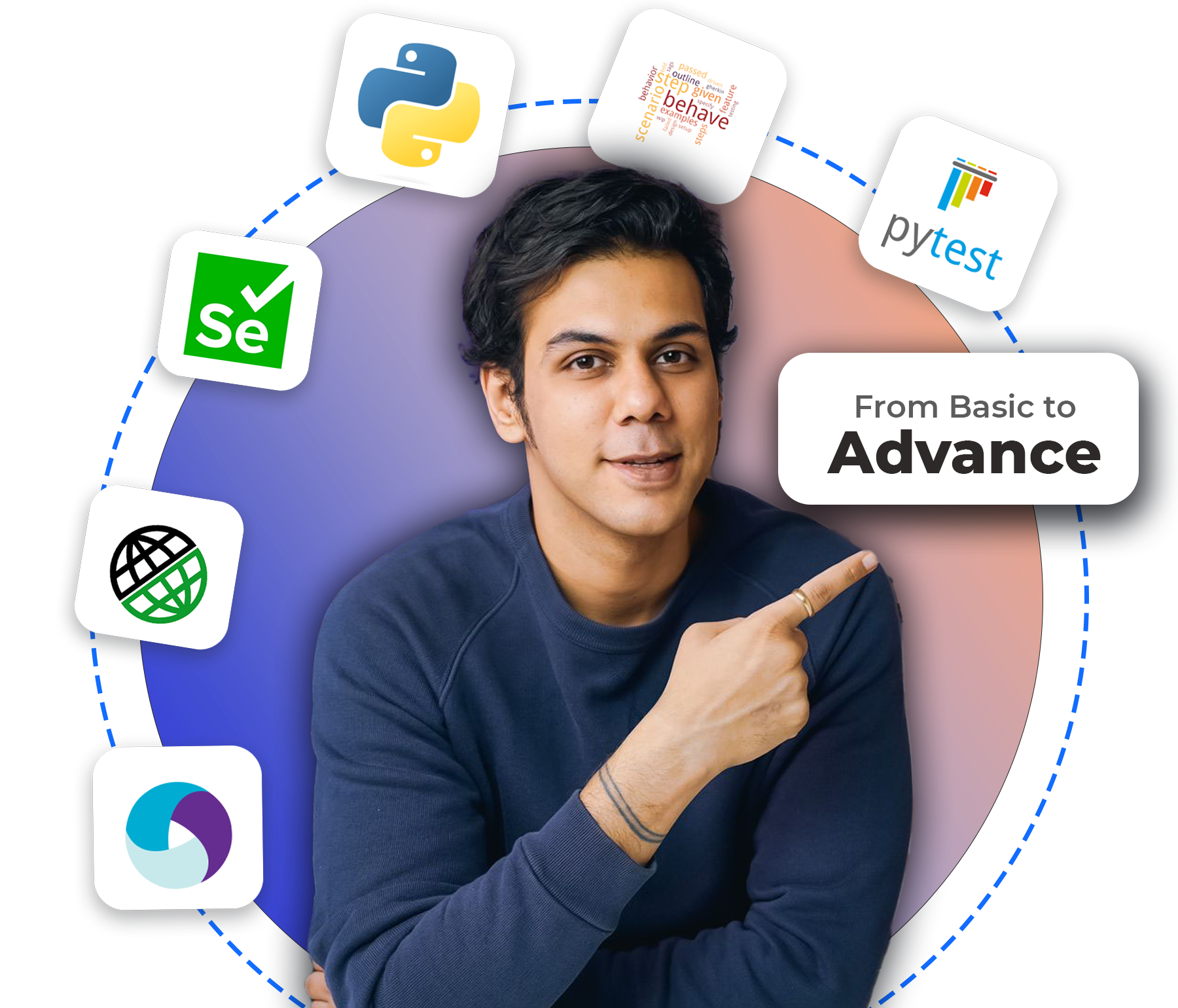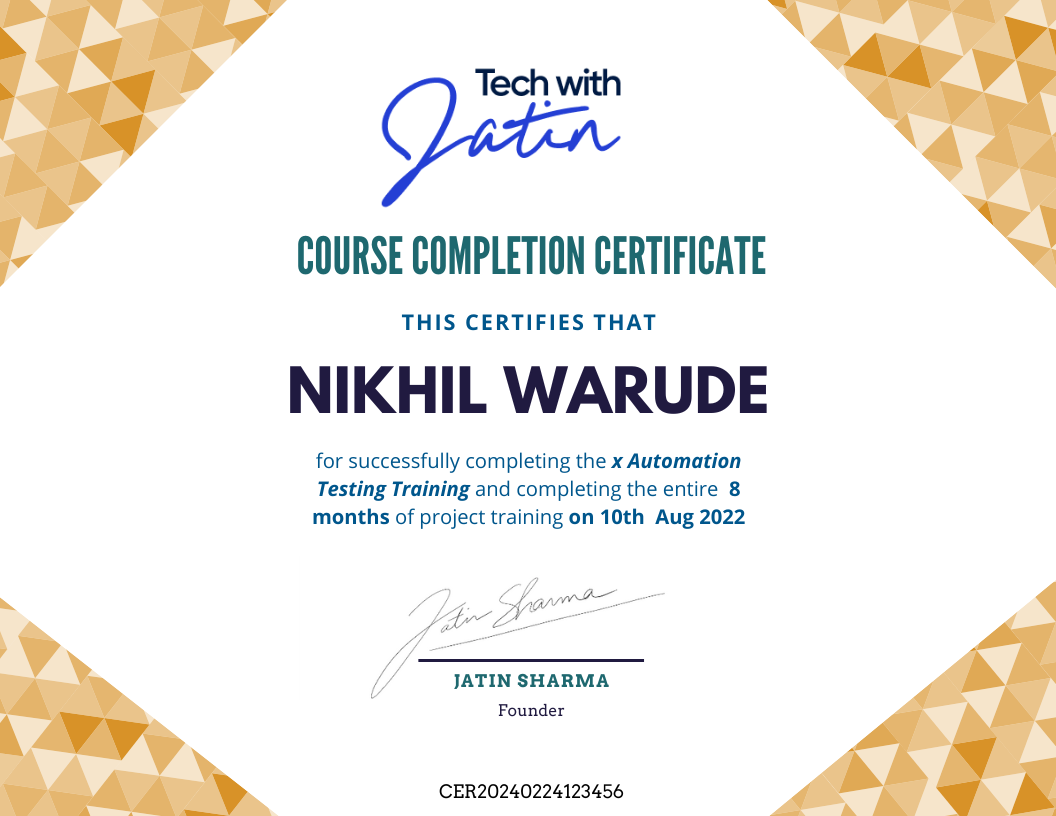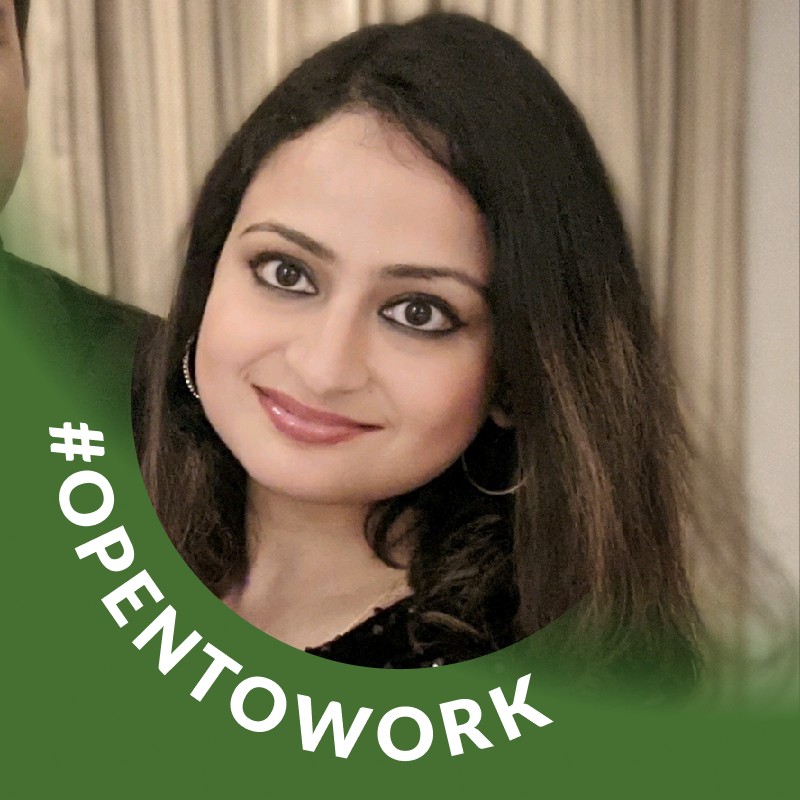
⚡ SDET Mastery with Python
Master UI-API-Mobile Automation testing in 5 months
- 170+ hours of Lessons
- Live Doubt solving classes
- Live Projects to put in Resume
- Duration: 5 months
- Language: English
- Modules : 11
- Certification: Yes
![]() Course Overview
Course Overview
- SDET Mastery Course is a customized bootcamp for students and professionals who wish to excel in the field of Automation for (UI-API-Mobile) Automation along with Performance Testing.
- This course isn’t just about learning automation; it’s about embracing an end-to-end understanding of UI, API, Mobile Automation and Performance Testing that propels careers and transforms futures.
- This Course designed by Jatin Shharma (10+ years of Experience in Automation and DevOps) so that students can understand automation testing from end to end spectrum and do not limit their knowledge to a particular tool.
- More than +2120 students have been able to not only learn automation testing but were also able to get better salary growth with this course.
![]()
![]()
![]()
![]()
![]()
Git
Time : 32 Minutes
In this module, we would go through a deep dive of understanding what is SCM, why you need it, and want is the internal working of GIT SCM. We then will move into understanding commits, branching, tags, and working with the remote repository. Throughout the course, we would be using Gitlab as the Remote Repository.
- Introduction to SCM
- Working with linux Command (Basix)
- Installing Git on local Machine
- Git Basic Commands
- Git Branches
- Merging Branches using Rebasing and Merge
- Handling Merge Conflicts
- Working with Remote Repositories
- Assignment Create Git Branch Model
API Testing with Postman
Time : 32 Minutes
In this module we will start by the Project KT. Understanding what needs to tested, how to write test cases and strategy for testing the application. This is the real time knowledge that will be useful to you to test and automate web applications.We will then move into the world of APIs and understand the reason to test APIs and how to test APIs.
- Project KT
- Understanding Web Application Component
- Different Types of API
- Components of API Request
- HTTP verbs
- Working with Variables in Postman
- Writing Tests in Postman using Chai.js
- Data Driven Testing in Postman
- Executing Postman Collection using newman and generating the report.
- Creating a Continous Testing Plan using Git Postman and Jenkins
Python Master Class
Time : 32 Minutes
This is heart of the entire course. In order to learn and master Automation Testing, your major focus should always be on learning programming language. This bootcamp will focus on Python Programming Language.
Introduction to Python
- Introduction to programming paradigms
- Python’s history and popularity
- Installing Python and setting up an IDE (e.g., Visual Studio Code, PyCharm)
- Running Python programs and using the interactive shell
- Understanding Python’s philosophy (PEP 8)
- Basic syntax and indentation rules
Python Basics
- Variables: naming conventions, assignment
- Data types: int, float, str, bool
- Type conversion and casting
- Strings: operations, methods, formatting
- Numeric operations: arithmetic, precedence
- Boolean logic: and, or, not
Control Flow
- Conditional statements: if, elif, else
- Comparison operators: ==, !=, <, >, <=, >=
- Logical operators: and, or, not
- Nested conditionals and complex conditions
- Loops: while loop, for loop
- Using the range() function for iteration
- Loop control: break, continue, pass
Data Structures
- Lists: creation, indexing, slicing, modifying
- List methods: append, insert, remove, pop, sort
- Tuples: creation, indexing, immutability
- Sets: creation, adding, removing, set operations
- Dictionaries: creation, accessing, adding, updating, deleting
- List comprehensions and generator expressions
Functions and Modules
- Functions: definition, parameters, return values
- Scope: local, global, nonlocal
- Lambda functions: syntax, use cases
- Modules: creating and using custom modules
- Importing modules and using functions from modules
- Exploring Python’s standard library
- Packages and managing dependencies using pip
File Handling and Exception Handling
- Reading and writing text files
- Handling file paths and directories
- Working with different file formats: CSV, JSON
- Exception handling: try, except, else, finally
- Handling multiple exceptions and raising exceptions
- Custom exceptions and error messages
Object-Oriented Programming (OOP)
- Introduction to OOP concepts
- Classes and objects: attributes, methods
- Constructors: init() method
- Inheritance: base class, derived class, method overriding
- Encapsulation: public, private, protected
- Polymorphism: method overloading, method overriding
- Abstract classes and interfaces
Design Patterns in Python
- Creational Patterns: Singleton, Factory, Abstract Factory, Builder
- Structural Patterns: Adapter, Decorator, Proxy, Composite
- Behavioral Patterns: Observer, Strategy, Command, Template Method
- Implementing each design pattern in Python
Advanced Concepts
- Decorators: creating and using decorators
- Generator functions and the yield keyword
- Iterators and iterables
- Context managers and the with statement
- List comprehensions, dictionary comprehensions, set comprehensions
- Using map(), filter(), and reduce() functions
Request Library API Testing
Time : 32 Minutes
Introduction to API Testing and requests Library
- Understanding the role of API testing in software development
- Exploring real-world examples of APIs and their usage
- Introduction to the
requestslibrary and its features - Setting up the development environment: installing Python and
requests
HTTP Basics
- Explaining the client-server architecture in HTTP
- Understanding the core HTTP methods: GET, POST, PUT, DELETE
- Exploring the structure of HTTP requests and responses
- Overview of common HTTP status codes and their meanings
Making Requests
- Importing the
requestslibrary and making the first GET request - Understanding the anatomy of a URL and endpoint
- Examining the structure of a response object from a GET request
- Using the
response.textattribute to access the response content
Query Parameters and Headers
- Adding query parameters to GET requests for filtering data
- Sending headers with requests: User-Agent, Accept, Content-Type
- Handling different response formats (JSON, XML, HTML)
Making POST Requests
- Sending data in the request body using the POST method
- Differentiating between form data and JSON payloads
- Handling response data from POST requests
Handling Authentication
- Understanding authentication methods (Basic Auth, Bearer Token)
- Sending Basic Authentication headers with requests
- Adding authentication tokens to headers for secure requests
Cookies and Sessions
- Handling cookies in web applications and API requests
- Using the
Sessionobject to maintain cookies across requests - Managing authentication and stateful sessions
Handling Response Data
- Parsing JSON responses using the
jsonmodule - Extracting data from JSON responses using Python dictionaries
- Handling different types of response content (text, binary)
Error Handling and Status Codes
- Dealing with different HTTP status codes in responses
- Handling errors gracefully using try-except blocks
- Raising custom exceptions for specific error scenarios
Advanced Topics
- Uploading files using POST requests (multipart/form-data)
- Sending and receiving data in XML format
- Handling redirects and automatically following links
- Customizing request timeout and retries
Pytest
Time : 32 Minutes
Introduction to Testing and Pytest
- Understanding the importance of testing in software development
- Introduction to testing frameworks and pytest’s features
- Setting up the development environment: installing Python and pytest
Writing Your First Test
- Exploring the structure of a basic pytest test function
- Creating a test file and organizing tests
- Running tests using the pytest command-line interface
Test Discovery and Naming Conventions
- Understanding pytest’s test discovery mechanism
- Naming conventions for test functions and files
- Using wildcard patterns to discover tests in a directory
Writing Test Functions
- Writing test functions with descriptive names
- Using assertion statements to validate test outcomes
- Running tests and interpreting pytest’s test results
Test Fixtures and Setup/Cleanup
- Introduction to test fixtures and their purpose
- Creating fixtures using the
@pytest.fixturedecorator - Using fixtures for test setup and cleanup operations
Parametrized Testing
- Understanding parametrized testing and its benefits
- Using the
@pytest.mark.parametrizedecorator - Running the same test with multiple input combinations
Skipping and Marking Tests
- Skipping tests using the
@pytest.mark.skipdecorator - Conditional skipping based on specific conditions
- Marking tests with custom labels for selective test execution
Test Coverage and Reporting
- Measuring code coverage with pytest-cov plugin
- Generating coverage reports and interpreting the results
- Generating HTML reports for detailed coverage analysis
Important Python Libraries
Time : 32 Minutes
-
Reading from Files:
- Built-in open(): For reading plain text files.
- csv: For reading and writing CSV files.
- json: For reading and writing JSON files.
- pickle: For reading and writing Python-specific serialized data.
- xlsxwriter: For reading Excel (.xlsx) files.
- xlrd: For reading Excel (.xls) files.
-
Database Access:
- sqlite3: For SQLite database access.
- SQLAlchemy: For working with various SQL databases.
- pymysql, psycopg2, cx_Oracle: For specific database engines like MySQL, PostgreSQL, and Oracle.
-
Web Data:
- requests: For making HTTP requests and fetching web data.
- beautifulsoup4: For web scraping and parsing HTML content.
- lxml: An alternative library for parsing XML and HTML content.
-
API Data:
- requests: For making API requests and handling responses.
- pycurl: For making HTTP requests with more advanced features.
- http.client: For low-level HTTP interactions.
Behave BDD
Time : 32 Minutes
Topics for Discussion:
Introduction to Behavior-Driven Development (BDD) and Behave
- Understanding the principles of BDD and its benefits
- Introduction to the
Behavelibrary for BDD in Python - Setting up the development environment: installing Python and
Behave
Gherkin Syntax and Feature Files
- Exploring the Gherkin syntax: Feature, Scenario, Given-When-Then
- Creating and structuring feature files with real-world examples
- Defining scenarios, steps, and placeholders in feature files
Installing and Running Behave
- Installing the
Behavelibrary using pip - Running Behave tests using the
behavecommand - Customizing test execution using command-line options
Step Definitions and Implementation
- Understanding step definitions and their role in BDD
- Creating step definition files for feature steps
- Mapping Gherkin steps to Python functions using decorators
Passing Data Between Steps
- Sharing data between step definitions using context
- Using step argument transformations for data conversion
- Handling dynamic values and variables in scenarios
Using Hooks
- Understanding hooks and their execution order
- Implementing
before_scenarioandafter_scenariohooks - Using hooks for setup and teardown operations
Scenario Outlines and Parametrized Testing
- Working with scenario outlines to run the same scenario with different data
- Using data tables in scenario outlines for parametrized testing
Tags and Test Organization
- Using tags to categorize and filter scenarios
- Running specific scenarios using tag expressions
- Organizing tests using tags for different test suites
Background and Given Steps
- Understanding the
Backgroundsection in feature files - Using
Givensteps to set up common preconditions - Enhancing scenario readability and maintainability
Advanced Topics
- Customizing Behave configuration using
behave.iniand command-line options - Using environment variables to parameterize Behave runs
- Writing custom step decorators and step argument transformations
Integrating with Test Frameworks (Optional)
- Integrating Behave with other testing frameworks (e.g.,
unittest,pytest) - Combining BDD-style tests with traditional unit tests
Reporting and Test Documentation
-
- Generating human-readable test reports using different formatters
- Creating test documentation from Gherkin feature files
- Interpreting test results and identifying failures
Selenium WebDriver
Time : 32 Minutes
- Learn Locating Elements
- Interacting With Elements
- Interacting With Dynamic Elements
- Managing Page Drivers
- Working with Windows/Popup and Frames
- Working with FileUploads
- Working with DatePicker
- Working with JavaScripts
- Working with Actions
- Working with Tables
- Syncronization in Selenium Webdriver
- Remote Browser Testing with BrowserStack and Selenium Grid
- Creating Browser Utility
Appium Mobile Automation
Time : 32 Minutes
In this module will learn how appium will help us in the (Android) mobile test automation. Appium is an open source test automation framework for use with native, hybrid and mobile web apps.
- Appium Architecture
- Setting up the Local Machine for Appium
- Working with Appium Inspecture
- Working with Gestures in Appium
- Working Page Object Design Pattern in Appium
- Taking Screenshots in Appium
- Continous Integration with Jenkins
Jenkins
Time : 32 Minutes
Introduction to Jenkins
- Introduction to CI/CD and its benefits
- Overview of Jenkins: History and purpose
Advanced Jenkins Concepts
- Installation and setup of Jenkins
- Navigating the Jenkins dashboard
- Creating and managing Jenkins jobs
CI/CD and Deployment Automation
- Configuring deployment pipelines with Jenkins
- Using tools like Docker for containerization in the deployment process
- Managing configuration and environment variables in Jenkins
- Security best practices for Jenkins: Authentication, authorization, and access control
Docker
Time : 32 Minutes
Introduction to Docker and Containerization
- Understanding the need for containerization
- Overview of Docker: History and purpose
- Core concepts: images, containers, and registries
- Installation and setup of Docker on different platforms
- Basic Docker commands and CLI usage
Docker Images and Containers
- Creating Docker images: Dockerfile and layers
- Building custom images for different applications
- Managing containers: creation, starting, stopping, and removal
- Data persistence and volumes in Docker
![]()
![]()
![]()
![]()
![]()
Projects you will be building
Experience the magic of the CI-CT-CD Pipeline and watch your development process become smoother, your code become more reliable, and your software reach users faster than ever. Say goodbye to manual tasks and hello to a streamlined, automated software journey.
- Experience the magic of the CI-CT-CD Pipeline and watch your development
- Experience the magic of the CI-CT-CD Pipeline and watch your development
Experience the magic of the CI-CT-CD Pipeline and watch your development process become smoother, your code become more reliable, and your software reach users faster than ever. Say goodbye to manual tasks and hello to a streamlined, automated software journey.
Experience the magic of the CI-CT-CD Pipeline and watch your development
Experience the magic of the CI-CT-CD Pipeline and watch your development
Experience the magic of the CI-CT-CD Pipeline and watch your development process become smoother, your code become more reliable, and your software reach users faster than ever. Say goodbye to manual tasks and hello to a streamlined, automated software journey.
Experience the magic of the CI-CT-CD Pipeline and watch your development
Experience the magic of the CI-CT-CD Pipeline and watch your development
![]()
![]()
![]()
![]()
![]()
Course Journey
Linux Module
First we will start with Linux Module. Our goal would be to master all important Linux commands that you will use on day to day basix while working on Cloud Servers.
Git Module
Learn Various Git commands that you will use on day to day basis that will help you work independently on your project!
Project KT
This is where will start with understanding the Project that we need to Automate!
Project KT is exactly similar that you get in your office.
Postman Automation
Experience the magic of the CI-CT-CD Pipeline and watch your development process become smoother, your code become more reliable
Java
Experience the magic of the CI-CT-CD Pipeline and watch your development process become smoother, your code become more reliable
API Automation
Using Postman and Rest Assured we will create a test automation framework for API component
UI Automation
Using Selenium WebDriver 4 we will create a test automation framework for UI component
Mobile Automation
Using Appium we will automate the Mobile Component
CI/CD
Finally we will the wrap the course by creating a impeccable CI pipleine using Jenkins and SONAR and Docker
Bonuses worth ₹60,000
Bonus 1
200+ Latest Scenario Driven Questions
₹20,000
Bonus 2
More than 100+ LeetCode Questions discussion
₹20,000
Bonus 3
Build Impressive Automation Project
₹30,000
Get Certified
- Earn your credential of Expertise
- Add Certificate to your resume!
- Add certificate to your Linkedin






Athrav PatilEngineer
I have taken one automation testing course from QSpider which was very Basic... i joined Jatin sirs training for SDET with Java was a game changer for me..
Thank you sir! Even in the interview people were impressed with the framework we built in classes




Shrey ShettyTest Engineer
Got to learn lot of new things under his mentorship regarding testing and framework. This also helped me a lot in landing job in onsite.



Renuka SidhaniQA
I have made the best decision in my career to join SDET course. It has been just a month so far I have learnt a-lot and I already got an offer with 80% hike!! I’m enjoying the learning experience here and excited for upcoming classes. Overwhelmed 😇


Kajal TalrejaTest Engineer
I have enrolled in the SDET bootcamp with Jatin and it's been a fantastic experience. The instructor (Jatin) has been incredibly knowledgeable and supportive. He has been there to help with all my questions, which has made the learning process much easier. I highly recommend Test Automation Academy for anyone looking to advance their skills in automation testing/Devops.


Anjali AnilQA Engineer
I have enrolled in the SDET bootcamp , and it's been an amazing experience. Jatin has been very supportive throughout the course. I highly recommend for anyone looking to upskill in automation testing and Devops


Mandar BhogateTest Automation Engineer
Very well in-dept understanding of automation concepts and assignment which help in practice of concepts......very much helpfull if any thing is not understood makes sure that each concept is understood by everyone in class.



Priyanka KalaTest Engineer
I highly recommend this course to everyone once in this field. The way Jatin explains the concepts, it not only explain well but make you learn and understand the topic during the class . The level of knowledge is like a sea & he delivers it very smoothly.
Practice part is also there with live projects.




Bharat VarmaQA manager
Equal attention was given to every individual which is the best part.Instructor Jatin is amazing.He helps you to learn concept in fun way and apply the concepts you learnt in practical way. Jatin is passionate about helping students. I highly recommend enrolling course with Jatin


Sonam JainSDET Engineer
I enrolled for Test Automation course and it has been amazing, Thank you Jatin, You clearly explained the basics in every sections and pointed out key things to remember as you teach, which were useful.


Afreen SheikhQA
I joined Jatin's Test Automation and DevOps course a couple of months ago, and it turned out to be a game-changer for my career.
Jatin explained complicated topics like AWS, Docker, CI/CD, Java, Test Automation Framework with such clarity that, with a bit of practice, I could perform tasks independently. I found training sessions engaging, well-structured, and tailored to provide hands-on approach and real-world examples.
This course taught me technical skills which are expected from a Tester in current international market along with testing.
I want to give 100% credit to the course content and Jatin's way of teaching for helping me develop skills to remain relevant in current competitive market.
I would definitely recommend this course to anyone aspiring to enhance their skill set and thrive in the ever-evolving world of Software Testing.
Thanks Jatin


Vinata JoshiSDET
I have joined Jatin's SDET classes last year and I highly recommend it to all the aspirants who wants to dive into the QA automation but dont know from where to start.His way of teaching is really good that one can understand the basics of Java very easily.
He gives personal attention to each of his student and really help in preparing for the Interview as well.
Thanks Jatin for giving me the confidence that it's never to late to start Automation.
Tech With Jatin is designed to swiftly equip students and professionals with the latest IT trends, boosting their career success. As a full-time content creator, I simplify complex technical topics and share automation case studies and interview tips on LinkedIn for those who prefer reading over social media.
Now, I'm on a mission to help you get to the 100% salary hike in next 5 months in SDET and DevOps.
Let's get connected on :


Our graduates cracked Top Companies
Frequently asked Questions
What is the Special thing in this course?
The duration of SDET Mastery Course Python is 5 months. Its one of the most exhaustive and in depth course you will ever find online or offline
Is this is a Live Course?
The entire course will be conducted by Jatin Shharma LIVE
I am from Non Techincal background (BPO, Bank or Operation Role) Will this course help me?
Yes, the projects that you learn with us goes back into your resume and hence for people who are from NON IT you will have complete IT work experience during learning.
Will i get the recordings?
All the classes are recorded and you have access to the course for 2 years
Is coding background obligatory?
No all topics are covered from scratch. So you dont need to know any thing related to Java
Will I earn an industry-recognized certification?
You get a 5 months training certification which you can add in to your resume. Along with that the training happens on the Live project which you can show case in your resume too!
Refund Policy?
The nature of the course is such that we dont offer refund to LIVE or self paced course. So before registration please go throught the curriculam and videos



















